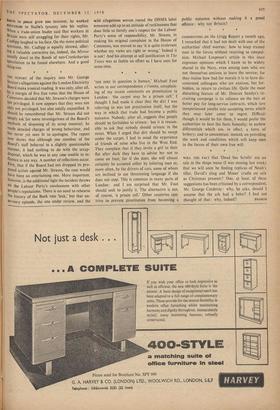T HE REPORT of the inquiry into Mr. George Strauss's allegations
against the London Electricity Board make ironical reading. It was only, after all, by a margin of five free votes that the House of Commons decided that Mr. Strauss's charges were not privileged. It now appears that they were not Only not privileged, but also totally unjustified. It should be remembered that Mr. Strauss did not simply ask'for some investigations of the Board's methods of disposing of its scrap material; he Made detailed charges of wrong behaviour, and has never yet seen fit to apologise. The report now shows that although one member of the Board's staff behaved in a slightly questionable manner, it had nothing to do with the scrap- disposal, which he was in any case unable to in- fluence in any way. A number of reflections occur. First, that if the Board had not dropped its pro- Posed action against Mr. Strauss, the case would have been an entertaining one. More important, however, is the additional light the incident throws O n the Labour Party's carelessness with other People's reputations. There is no need to rehearse the history of the Bank rate 'leak,' but that un- savoury episode, the one under review, and the wild allegations woven round the OHMS label nonsense add up to an attitude of recklessness that does little to fortify one's respect for the Labour Party's sense of responsibility. Mr. Strauss, in making his original complaint in the House of Commons, was moved to say 'it is quite irrelevant whether my views are right or wrong.' Indeed it is not ! And his attempt at self-justification in The Times was as feeble an effort as I have seen for some time.






































 Previous page
Previous page